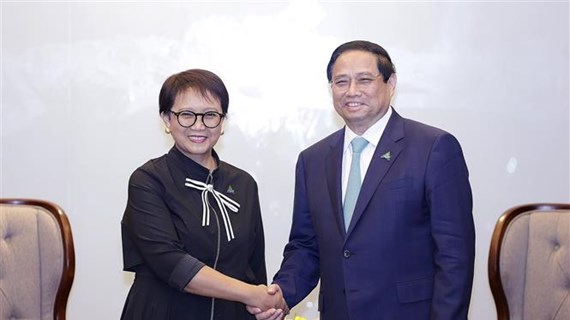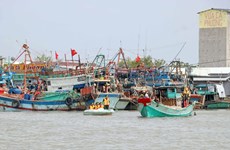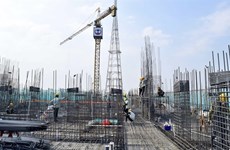Donor pledges top 8 billion USD
International donors on Dec. 4 pledged
a record aid of more than 8 billion USD to Vietnam for the next year.
International donors on Dec. 4 pledged
a record aid of more than 8 billion USD to Vietnam for the next year, a
rise of more than 3 billion USD compared to last year.
Within the package, 1.4 billion USD will be in the form of grants while the rest, 6.6 billion USD, will be in concessional loans, said Planning and Investment Minister Vo Hong Phuc at a press conference after a two-day dialogue between the international donors and the Government.
The World Bank is the biggest multilateral donor this year, doubling last year’s commitment of 2.5 billion USD. It is followed by the Asian Development Bank with nearly 1.5 billion USD. Among bilateral donors, Japan stands out with the biggest pledge of 1.64 billion USD.
Phuc thanked the donors and said that the Vietnamese government will “respectfully” and effectively use “every penny” of their aid. He also confirmed that the assistance will help Vietnam stabilise the macro-economy, maintain the pace of growth and step up poverty reduction.
The minister discounted concerns about the national capacity to repay foreign debts, firmly saying that payment of public debts is still “sustainable.”
Vietnam pays debts on time
Minister Phuc admitted that, although the country’s public debt is high, it is “within the acceptable level” and Vietnam's repayment to international organisations has always come on schedule.
“Every year, we still allocate part of the national budget to repay debts as committed to donors and we have never been late to any country,” Phuc reiterated.
The minister emphasised that the greatest concern for the government now is how to disburse the aid quickly and effectively in order not only to boost growth but also to improve the mechanism whereby poor people are encouraged to get more involved in the growth process.
ADB Country Director Ayumi Konishi meanwhile said the concern is unnecessary since every ODA project, such as power or expressway projects, goes through “very careful calculation” to make sure that it generates sufficient funds to pay back the loans by itself.
WB Country Director to Vietnam Victoria Kwakwa also said “analysis suggested that Vietnam has no major issue with sustainability of its debt.” She said she believed “this is something the Government will monitor very closely” to make sure that it is moving in the right direction and in line with “very prudent fiscal management”.
Social welfare concerns the most
Vietnam’s economic achievements in 2009, especially the government’s flexible monetary and fiscal policies, were acclaimed during the donor gathering this year. Yet, attention was called to the growing challenges that Vietnam will have to face on its way to becoming a middle-income country.
Kwakwa pointed at a “stronger social security/ protection system” as the greatest challenge for the country in the coming time.
Building a strong social security system to provide support for the majority of the population to “cushion them against any shocks”, whether it be external like the financial crisis or internal such as people losing their jobs, unemployment insurance or pensions.
Government reports suggested that the poverty rate fell to 11 percent this year from 14 percent in 2008 and 58 percent in 1993. However, UN Resident Coordinator, Jesper Morch, reminded that looking at poverty in terms of deprivation and not only in terms of income, one of three children in Vietnam is poor in terms of being deprived of basic needs such as education, sanitation or social inclusion or protection.
The challenge that Vietnam now faces in becoming a middle income country is “to continue economic growth but find ways of investing also into Vietnam’s human capital and addressing inequality, especially protecting and empowering groups in society that are at the moment not fully benefitting from the growth,” he said.
In response to these recommendations, Minister Phuc said that even as Vietnam is moving toward middle income status, poverty reduction “remains a core issue”.
The government is working with the donor community to channel more assistance to poor people, especially those in ethnic minority groups, to engage them more in the development process.
The donors also agreed that Vietnam should continue administrative reform, anti-corruption efforts, and stabilise the macro economy, reform state-owned enterprises and improve state governance./.
Within the package, 1.4 billion USD will be in the form of grants while the rest, 6.6 billion USD, will be in concessional loans, said Planning and Investment Minister Vo Hong Phuc at a press conference after a two-day dialogue between the international donors and the Government.
The World Bank is the biggest multilateral donor this year, doubling last year’s commitment of 2.5 billion USD. It is followed by the Asian Development Bank with nearly 1.5 billion USD. Among bilateral donors, Japan stands out with the biggest pledge of 1.64 billion USD.
Phuc thanked the donors and said that the Vietnamese government will “respectfully” and effectively use “every penny” of their aid. He also confirmed that the assistance will help Vietnam stabilise the macro-economy, maintain the pace of growth and step up poverty reduction.
The minister discounted concerns about the national capacity to repay foreign debts, firmly saying that payment of public debts is still “sustainable.”
Vietnam pays debts on time
Minister Phuc admitted that, although the country’s public debt is high, it is “within the acceptable level” and Vietnam's repayment to international organisations has always come on schedule.
“Every year, we still allocate part of the national budget to repay debts as committed to donors and we have never been late to any country,” Phuc reiterated.
The minister emphasised that the greatest concern for the government now is how to disburse the aid quickly and effectively in order not only to boost growth but also to improve the mechanism whereby poor people are encouraged to get more involved in the growth process.
ADB Country Director Ayumi Konishi meanwhile said the concern is unnecessary since every ODA project, such as power or expressway projects, goes through “very careful calculation” to make sure that it generates sufficient funds to pay back the loans by itself.
WB Country Director to Vietnam Victoria Kwakwa also said “analysis suggested that Vietnam has no major issue with sustainability of its debt.” She said she believed “this is something the Government will monitor very closely” to make sure that it is moving in the right direction and in line with “very prudent fiscal management”.
Social welfare concerns the most
Vietnam’s economic achievements in 2009, especially the government’s flexible monetary and fiscal policies, were acclaimed during the donor gathering this year. Yet, attention was called to the growing challenges that Vietnam will have to face on its way to becoming a middle-income country.
Kwakwa pointed at a “stronger social security/ protection system” as the greatest challenge for the country in the coming time.
Building a strong social security system to provide support for the majority of the population to “cushion them against any shocks”, whether it be external like the financial crisis or internal such as people losing their jobs, unemployment insurance or pensions.
Government reports suggested that the poverty rate fell to 11 percent this year from 14 percent in 2008 and 58 percent in 1993. However, UN Resident Coordinator, Jesper Morch, reminded that looking at poverty in terms of deprivation and not only in terms of income, one of three children in Vietnam is poor in terms of being deprived of basic needs such as education, sanitation or social inclusion or protection.
The challenge that Vietnam now faces in becoming a middle income country is “to continue economic growth but find ways of investing also into Vietnam’s human capital and addressing inequality, especially protecting and empowering groups in society that are at the moment not fully benefitting from the growth,” he said.
In response to these recommendations, Minister Phuc said that even as Vietnam is moving toward middle income status, poverty reduction “remains a core issue”.
The government is working with the donor community to channel more assistance to poor people, especially those in ethnic minority groups, to engage them more in the development process.
The donors also agreed that Vietnam should continue administrative reform, anti-corruption efforts, and stabilise the macro economy, reform state-owned enterprises and improve state governance./.












